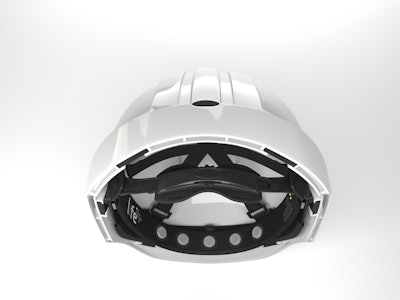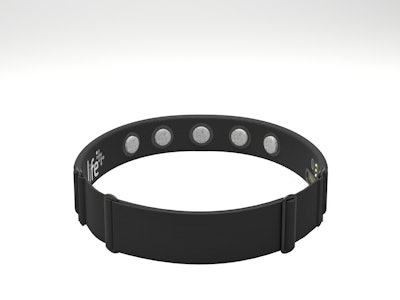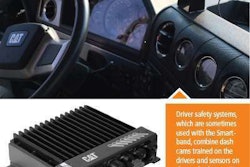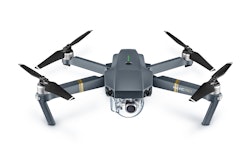 SmartCap’s Life Band inside a hard hat.
SmartCap’s Life Band inside a hard hat.The signs are unmistakable: the head bob, the eyes that have trouble remaining open, a blank stare. These are all symptoms of “microsleeps,” or brief episodes of fatigue-based loss of attention. While these may be common when you’re parked on your couch in front of the TV at night, they can be deadly if they occur when you’re operating equipment or driving a truck.
Devices aimed at detecting and alerting an operator when he or she is unable to resist sleep are growing. Cat’s Smartband fatigue monitoring system, for example, uses a Fitbit-like device that, combined with dash cameras, can tell if a worker is suffering from lack of sleep.
 The Life Band can be used with several types of headwear.
The Life Band can be used with several types of headwear.At the MINExpo show earlier this month, SmartCap unveiled its latest entry in the fatigue-awareness technological race: a wearable band connected to a smart phone app. Instead of using in-cab cameras that alert drivers and operators when physiological symptoms are observed, the Australian company instead uses EEG (electroencephalography, or brain waves) to monitor fatigue.
“We’re not talking about detecting microsleeps, we’re in the business of eliminating them,” declares Dush Wimal, company CEO, in an interview on the show floor. “Physiological signs are a lagging indicator. We can intervene early, and stop you from having a microsleep altogether.”
SmartCap’s technology is completely wearable: whatever a worker uses for head gear—be it hard hat, ball cap, cowboy hat, head band, etc.—the technology fits into the head wear and goes with the employee. Instead of the monitoring device being imbedded in a machine, it’s on the worker, no matter where he goes or what he operates.
The SmartCap setup is simple: a sensor-equipped Life Band, which determines alertness levels, is inserted into the user’s head wear. The user then downloads the company’s Life App, available at the Apple Store and Google Play.
Using the Bluetooth-connected app, users can get real-time voice-and-vibration alerts on impending microsleeps, track their alertness levels throughout a timeline and even get a warning if the head wear is fitted incorrectly. The five sensors on the rechargeable Life Band also can be easily replaced, and it’s washable and unaffected by sweat.
Wimal sees behavioral modification as one potential upside to this product, since the app helps the employee understand his own alertness data. “It can be worn anywhere,” he says, “so you can monitor your alertness when you’re driving home, for example. For us, this is about saving lives, and that’s not just a matter of when someone is working.”
Similar to how a running app tracks your distance, the Life App will chart your fatigue patterns. “If you are truly looking for data to help you change behavior, you need to understand the total person, and not just when they’re in the machine,” Wimal says. “Let’s say you’re normally alert in the morning, but one morning you’re not, and you realize that you were up late watching the game last night and had an extra beer. Then you can consider whether or not you should be doing that.”
Aware of privacy concerns, Wimal says that the data coming off the Life Band is coded with an ID number instead of a name. And there’s no need for an in-cab camera, which addresses another privacy issue. “We’re not taking pictures,” Wimal says.
SmartCap was developed within CRCMining, a cooperative research center established by the Australian government and supported by four universities and 13 industry partners, including equipment manufacturers and mining companies. Since its start in 2008, SmartCap has undergone successful field trials in surface mining operations that monitored operators of haul trucks, excavators, dozers, graders and water trucks.
The app-connected Life Band is the latest iteration of this technology. Wimal says the cost typically is around $2 per person per day for mining applications, and about a $1 per person per day for trucking operations, depending on the number of users and level of contracted service.
“We’re moving rapidly into wearables, and we want to get into the consumer space in about three years,” Wimal says.













